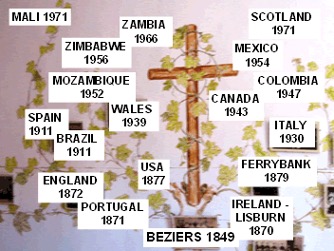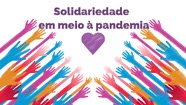Heritage and Spirituality Group
Sr. Rosinha Pereira, RSCM
The statistics prove something that would already be evidence: the more precarious living conditions, the more vulnerable HUMAN BEINGS become to environmental aggression, a pandemic.
I- At the public hearing on August 26, 2020, as he always does on Wednesdays, Pope Francis gave a guiding speech to all of us who are submitted to the attack of Covid-19. The Pope went straight to the wound: “This virus is the consequence of a sick economy. It persists through the exploitation of people and the devastation of nature, something that I myself have been insisting on, in contrast to most social media analysts about the origin of Covid-19. They consider the virus itself as something isolated that must be exterminated, without analysing the context in which it developed and what caused its emergence: a system of production that seeks to dominate and possess nature, seeking wealth and creating ecological injustice and planetary social injustice. It is an anti-life system. Either we end it or it will end life on Earth, including the human species, as several experts in the world warn us, especially biologists and ecologists. »
Theologian and environmentalist Leonardo Boff suggests :”We can produce not to accumulate wealth, but to have enough and decent for all, in harmony with the cycles of nature and the sense of solidarity with present and future generations”. For him, “what is killing is not exactly Coronavirus, but the low immunity of the great part of our population”!
In his speech, Pope Francis continues:
« The pandemic has exposed and aggravated social problems, above all that of inequality. Some people can work from home, while this is impossible for many others. Certain children, not withstanding the difficulties involved, can continue to receive an academic education, while this has been abruptly interrupted for many, many others. Some powerful nations can issue money to deal with the crisis, while this would mean mortgaging the future for others.
These symptoms of inequality reveal a social illness; it is a virus that comes from a sick economy. And we must say it simply: the economy is sick. It has become ill. It is the fruit of unequal economic growth — this is the illness: the fruit of unequal economic growth — that disregards fundamental human values. In today’s world, a few wealthy people possess more than all the rest of humanity. I will repeat this so that it makes us think: a few wealthy people, a small group, possess more than all the rest of humanity. This is pure statistics. This is an injustice that cries out to heaven!
At the same time, this economic model is indifferent to the damage inflicted on our common home. Care is not being taken of our common home. We are close to exceeding many limits of our wonderful planet, with serious and irreversible consequences: from the loss of biodiversity and climate change to rising sea levels and the destruction of the tropical forests.
Social inequality and environmental degradation go together and have the same root (cf. Encyclical, Laudato Si’, 101): the sin of wanting to possess and wanting to dominate over one’s brothers and sisters, of wanting to possess and dominate nature and God himself. But this is not the design for creation.
“In the beginning God entrusted the earth and its resources to the common stewardship of mankind to take care of them” (Catechism of the Catholic Church, 2402).
II- OUR RSCM HISTORY shows us that this challenge is not exclusive to our times today. We have records of it in the books that tell of our origins, specifically in 18th and 19th century in France, the environment in which our Founders, their families and our first RSCM Communities and Works lived.
The following words, from Pope Francis, are a perfect and inspiring introduction to better understand the situation lived by Father Gailhac and the “impetus” of our first RSCM Communities:
« When the obsession to possess and dominate excludes millions of persons from having primary goods; when economic and technological inequality are such that the social fabric is torn; and when dependence on unlimited material progress threatens our common home, then we cannot stand by and watch. No, this is distressing. We cannot stand by and watch! With our gaze fixed on Jesus (cf. Heb 12:2) and with the certainty that His love is operative through the community of His disciples, we must act all together, in the hope of generating something different and better. Christian hope, rooted in God, is our anchor. It moves the will to share, strengthening our mission as disciples of Christ, who shared everything with us.
The first Christian communities understood this. They lived difficult times, like us. Aware that they formed one heart and one soul, they put all of their goods in common, bearing witness to Christ’s abundant grace in them (cf. Acts 4:32-35). We are experiencing a crisis. The pandemic has put us all in crisis. But let us remember that after a crisis a person is not the same. We come out of it better, or we come out of it worse. This is our option. »
- A JOURNEY IN FAITH AND IN TIME-VOL. I- Chap.1- Jean Gailhac
Chaplain of Béziers Central Hospital – The official appointment to the chaplaincy of the hospital is dated September 12, 1828 It reads : “We name [J Gailhac] chaplain of the Military Hospital of the city of Béziers and confer upon him all necessary powers to fulfill all the functions incumbent upon him “. From this date on, Jean Gailhac was chaplain of the hospital, with full powers to fulfill his mission.
… Gailhac’s devotion to his duties was so great that in November 1829 he was advised by Father Bastet – « take care not to work so hard, (illegible) getting up at night without necessity. In a few years you will feel the results of having done too much. »
… In 1832 an epidemic of cholera spreads through the city increasing the number of hospital patients. Jean Gailhac had not a moment’s rest and in the end contracted pleurisy. Turning to vigorous medical prescriptions, he did not let the illness overcome him and a short time later he was back at work in the hospital once again.
… The letter of March 7, 1832 is, no doubt, another intense and decisive moment in Gailhac’s spiritual experience. He renewed once again his initial choice to be a priest only to love God and bring others to love Him, giving himself more and more to his priestly ministry.
Among the illnesses which J.Gailhac encountered in the hospital were those caused by prostitution. A special room was set aside for the treatment of women suffering from such illnesses. Jean Gailhac was sensitive to the degrading situation in which these women lived. During their stay in the hospital, he gave them spiritual assistance, succeeding in convencing some to change their way of life and even to receive the sacraments. However, once they were cured and returned to their former environment, most did not persevere in their good intentions. This situation convinced Gailhac that hospital care was not enough. He saw that these women were victims of their social context and he was moved with compassion. No doubt he remembered his conversations with Father Martin many years ago about the need to assist these young women and realized that to find a more long-term solution, further steps were called for…
former environment, most did not persevere in their good intentions. This situation convinced Gailhac that hospital care was not enough. He saw that these women were victims of their social context and he was moved with compassion. No doubt he remembered his conversations with Father Martin many years ago about the need to assist these young women and realized that to find a more long-term solution, further steps were called for…
He dreamt of a house which would allow a larger group to experience God’s merciful love and to deepen their desire to live in the dignity of their creation in the image and likeness of God.
- A JOURNEY IN FAITH AND IN TIME-VOL.I-Chap.9 – TRIALS
“Sickness and death are two realities which tested the new Institute throughout Mother Saint Jean’s generalate. From the very first days, both personal illness and epidemic struck the sisters. In 1854, a large part of the community and of the students contracted cholera. Eventhough they had taken every possible precaution, the sisters did not succeed in preventing the death of three orphans . In September of the same year, the community and many students came down with a high fever accompanied by cold sweats. Only two sisters, one of whom was Mother Saint-Félix, remained unaffected, and day and night they took care of those who were sick. Finally, Mother Saint-Félix became so exhausted that it took her two years to recover her health completely. Fifteen sisters of the Sacred Heart died during the life of Mother Saint Jean. Among these were two novices and three postulants. The death of Mothers Sainte-Marie Eustache, Saint-Cyprien Froment and Saint-Stanislas Gibbal, all of whom were part of the first profession group, caused great sorrow in the other members of the community. Mother Sainte-Marie, who died on February 6, 1853, lived for only a short time as a professed sister, but distinguished herself by her gentleness, humility and obedience. Mother Saint-Cyprien suffered from dropsy in her legs and other health problems, but she remained active as long as possible, dying on July 4, 1856. Mother Saint-Stanislas, never very strong, died on December 15, 1859. Although the entire community felt very much the sickness and death of the sisters, Mother Saint-Jean’s sorrow was so deep that it affected her own health »
French Article:
TEMPS DE PANDÉMIE… MOMENTS DE SOLIDARITÉ !










